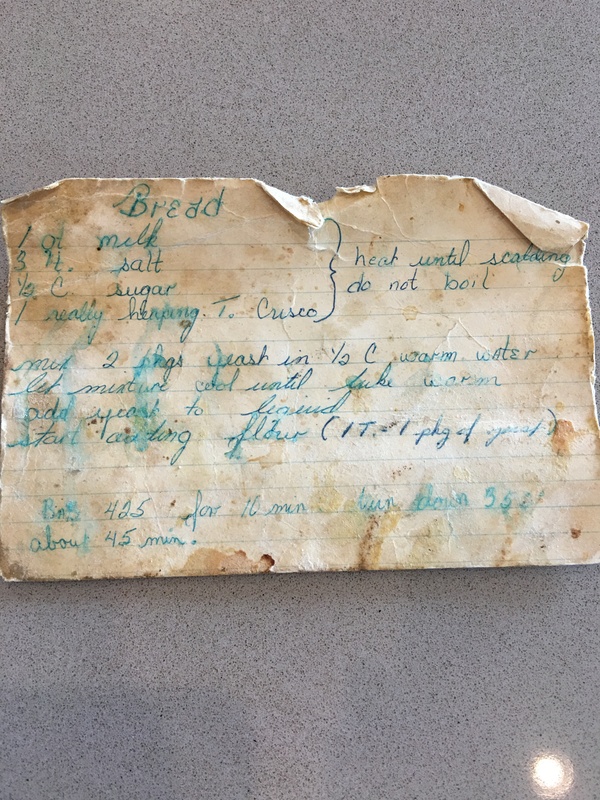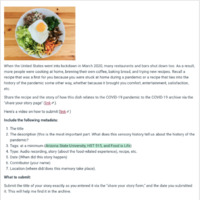Item
Baking: Impossible
Title (Dublin Core)
Baking: Impossible
Disclaimer (Dublin Core)
DISCLAIMER: This item may have been submitted in response to a school assignment. See Linked Data.
Description (Dublin Core)
Back in December of 2019, my wife and I were visiting my parents and grandparents in Mesa, Arizona. It was Christmas time, so we were enjoying a bit of leisure time that we typically didn't have. I had just graduated from Brigham Young University-Idaho with a degree in History Education, and my wife just finished a rigorous semester in her study of English at the same school. We were ready for a break.
Before meeting up with the family, my grandmother brought up the idea to teach my wife and I how to make homemade bread. It was her grandmothers recipe, and I loved it, as she would occasionally make the dough to make scones or kraut biscuits. This particular recipe made a lot of dough and needed to rise three times. Because of this, making bread was an all day event.
Just a few short months after learning to make bread in my grandmother's kitchen, COVID-19 shut down the world. We were living in Rexburg, Idaho at the time-a small town of around 28,000 people located in south-east Idaho. Given that we were in a rural location, we didn't feel the immediate effects of the virus like Seattle, New York City, and Los Angeles. However, around early March, schools shut down and we were told to stay indoors whenever possible.
Given that I was a teacher, I was suddenly learning how to run applications like Google Classroom to teach from home. The school district wasn't sure how long I would be working from home for. Initially, they only wanted to close for two weeks to deep clean the school. However, this ended up lasting through the end of the school year.
My wife was now also at home. Her studies switched from in-person courses to online courses. Professors who had spent their life in the classroom were suddenly figuring out how to teach via a new medium. It was challenging for all, but everyone seemed to be more patient with each other.
Given that my wife and I were home, and given that we had more time, we decided that we would make the bread recipe that my grandmother had taught us over Christmas break. Everyone was encouraged to only shop when absolutely necessary, so we added the flour and yeast to our shopping list. However, when we went shopping only a few days later, the baking isle had been decimated. The only types of flour that were left were expensive bags of specialty flour that came in much smaller portions. Yeast was nowhere to be found. Even things like baking soda were gone.
When I think back to the early days of the pandemic, I think of panic. While my wife and I were able to remain calm, many people worried they would not be able to find basic necessities. Grocery stores ran short on many items-toilet paper, canned food, flour, sugar, paper towels, cleaning supplies, amongst other things. Many things that were taken for granted were now an uncertainty. So while we did have more time on our hands, baking bread wasn't an option.
Before meeting up with the family, my grandmother brought up the idea to teach my wife and I how to make homemade bread. It was her grandmothers recipe, and I loved it, as she would occasionally make the dough to make scones or kraut biscuits. This particular recipe made a lot of dough and needed to rise three times. Because of this, making bread was an all day event.
Just a few short months after learning to make bread in my grandmother's kitchen, COVID-19 shut down the world. We were living in Rexburg, Idaho at the time-a small town of around 28,000 people located in south-east Idaho. Given that we were in a rural location, we didn't feel the immediate effects of the virus like Seattle, New York City, and Los Angeles. However, around early March, schools shut down and we were told to stay indoors whenever possible.
Given that I was a teacher, I was suddenly learning how to run applications like Google Classroom to teach from home. The school district wasn't sure how long I would be working from home for. Initially, they only wanted to close for two weeks to deep clean the school. However, this ended up lasting through the end of the school year.
My wife was now also at home. Her studies switched from in-person courses to online courses. Professors who had spent their life in the classroom were suddenly figuring out how to teach via a new medium. It was challenging for all, but everyone seemed to be more patient with each other.
Given that my wife and I were home, and given that we had more time, we decided that we would make the bread recipe that my grandmother had taught us over Christmas break. Everyone was encouraged to only shop when absolutely necessary, so we added the flour and yeast to our shopping list. However, when we went shopping only a few days later, the baking isle had been decimated. The only types of flour that were left were expensive bags of specialty flour that came in much smaller portions. Yeast was nowhere to be found. Even things like baking soda were gone.
When I think back to the early days of the pandemic, I think of panic. While my wife and I were able to remain calm, many people worried they would not be able to find basic necessities. Grocery stores ran short on many items-toilet paper, canned food, flour, sugar, paper towels, cleaning supplies, amongst other things. Many things that were taken for granted were now an uncertainty. So while we did have more time on our hands, baking bread wasn't an option.
The photo is my great-great grandmothers recipe card.
Date (Dublin Core)
Creator (Dublin Core)
Contributor (Dublin Core)
Event Identifier (Dublin Core)
HST515
Partner (Dublin Core)
Type (Dublin Core)
Text Story
Controlled Vocabulary (Dublin Core)
Curator's Tags (Omeka Classic)
Contributor's Tags (a true folksonomy) (Friend of a Friend)
History515
#FoodIsLife
Arizona State University
Bread
Shortage
Pandemic
Collection (Dublin Core)
Linked Data (Dublin Core)
Date Submitted (Dublin Core)
08/08/2021
Date Modified (Dublin Core)
08/10/2021
This item was submitted on August 8, 2021 by Judd Watson using the form “Share Your Story” on the site “A Journal of the Plague Year”: http://mail.covid-19archive.org/s/archive
Click here to view the collected data.

